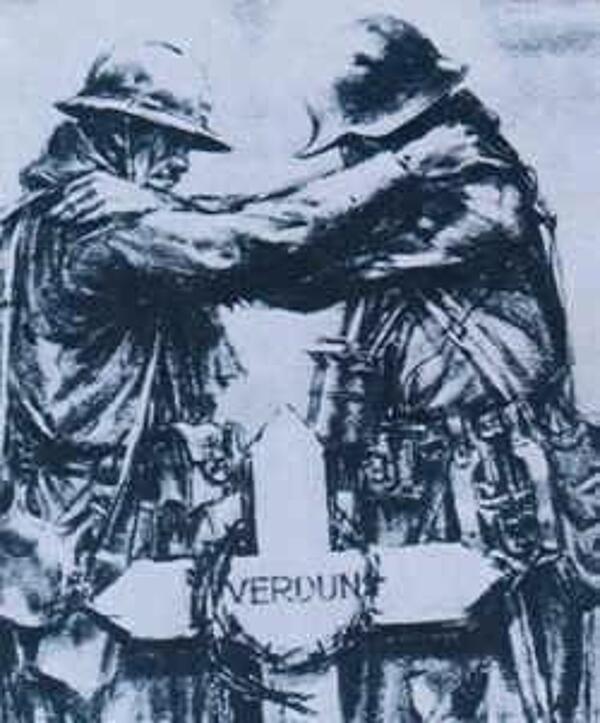The Battle of Verdun
The Battle of Verdun was the longest in World War One, with the resulting casualties and impact it had on the French Army being the main factor behind the start of the Battle of the Somme.
The Battle of Verdun began on 21st February 1916 and was the result of a plan by the German Chief of General Staff, General von Falkenhayn, who wanted to “bleed France white” by launching an attack on a narrow stretch of land with historic sentiment - Verdun.
The area around Verdun contained 20 major forts and 40 smaller forts that had historically protected the eastern border of France and had recently been modernised. Falkenhayn believed that the French would not allow these forts to fall and so would lost as many men as they had to in order to prevent it.
In a letter to Kaiser Wilhelm II, Falkenhayn wrote:
"The string in France has reached breaking point. A mass break-through - which in any case is beyond our means - is unnecessary. Within our reach there are objectives for the retention of which the French General Staff would be compelled to throw in every man they have. If they do so the forces of France will bleed to death."
While Falkenhayn’s plan was credible, it also assumed that the French would be an easy opponent that it would be them who sustained major casualties. In some respects this was right - ammunition had been moved from the forts to the Western Front and the trenches dug for defence in the area had not been finished. French senior officers at the fort complex completed to Joffre but he rejected their complaints.

Around 140,000 german troops started the attack, with 1,200 artillery guns, 1,300 ammunition trains and 168 planes, which was the largest concentration of planes up to that point in history. On the other hand, the French had just 30,000 troops.
On the day the war began, 1,000 german artillery guns fired on a six mile line along the French front. The attack was devastating and one man wrote:
"Men were squashed. Cut in two or divided from top to bottom. Blown into showers; bellies turned inside out; skulls forced into the chest as if by a blow from a club."
The Germans then used flame throwers for the first time, which helped them advance and capture 10,000 French prisoners. In fact, the fort at Douaumont, which was considered to be the most powerful in the world, was manned by just 56 elderly part-time gunners who offered no resistance.
As the forts fell, General Philippe Pétain was put in charge of the defence of Verdun, which was no easy task. There was just a single road into Verdun and it was only 20ft wide. However, 25,000 tons of supplies were move into Verdun via this road, as well as 90,000 soldiers in 6,000 vehicles. It is believed that 66 per cent of the French Army actually passed up this road at some time during the battle. However, the French continued to suffer. Two soldiers wrote:
"You eat beside the dead; you drink beside the dead, you relieve yourself beside the dead and you sleep beside the dead."
"People will read that the front line was Hell. How can people begin to know what that one word - Hell - means."
The Germans also suffered huge losses, and by the end of April they had lost 120,000 men to the French Army’s 133,000.
As the battle entered the Spring of 1916, Pétain asked Joffre for more men but the latter refused, stating that he wanted them for a planned attack on the Somme. Pétain was then replaced by General Nivelle, a soldier who believed in a fully offensive strategy, and by the summer the French had regained some of their air supremacy.
However, this coined for nothing as the ground battle raged on and became one of attrition. Many French soldiers described the scenes:
"Hell cannot be so terrible as this. Humanity is mad; it must be mad to do what it is doing."
"An artery of French blood was spilt on February 21st and it flows incessantly in large spurts."
"I saw a man drinking avidly from a green scum-covered marsh, where lay, his black face downward in the water, a dead man lying on his stomach and swollen as if he had not stopped filling himself with water for days."
"To die from a bullet seems to be nothing; parts of our being remain intact; but to be dismembered, torn to pieces, reduced to pulp, this is the fear that flesh cannot support and which is fundamentally the great suffering of the bombardment."
Just 150 miles away in the French capital, French soldiers lucky enough to get leave from Verdun enjoyed the splendour of city life. However. they soon realised they were being paid sixty times less than a French factory worker and soon feelings of discontent bubbled over. In 1917, a mutiny would begin.
Back on the front lines, on 1st June, German launched at attack that got them within 2.5 miles of Verdun by 23rd June. However, this stretched the German Army to its limited and by 24th June the bombardment of the Somme could be heard at Verdun as the British attempted to relieve the French Army. Within days, the Somme dominated military planners on the Western Front and by October 1916, France had re-captured two forts.
The Battle of Verdun continued until December, after the Somme was considered to have ended, and the loss of life was finally estimated. Although there are no accurate figures, historians believe the French lost over 360,000 men and the Germans lost nearly 340,000.
MLA Citation/Reference
"The Battle of Verdun". HistoryLearning.com. 2026. Web.
